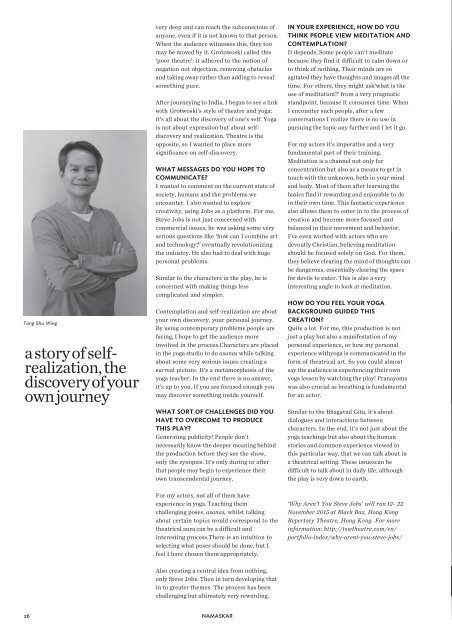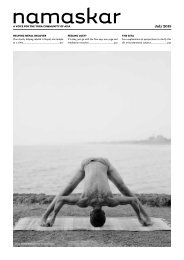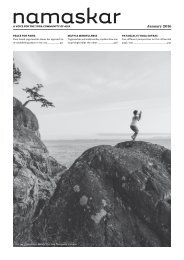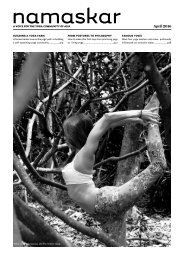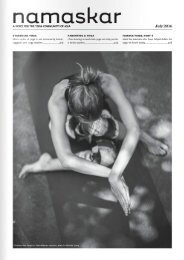Namaskar Oct 2015
Create successful ePaper yourself
Turn your PDF publications into a flip-book with our unique Google optimized e-Paper software.
Tang Shu Wing<br />
a story of selfrealization,<br />
the<br />
discovery of your<br />
own journey<br />
very deep and can reach the subconscious of<br />
anyone, even if it is not known to that person.<br />
When the audience witnesses this, they too<br />
may be moved by it. Grotowoski called this<br />
‘poor theatre’; it adhered to the notion of<br />
negation not objection, removing obstacles<br />
and taking away rather than adding to reveal<br />
something pure.<br />
After journeying to India, I began to see a link<br />
with Grotwoski’s style of theatre and yoga;<br />
it’s all about the discovery of one’s self. Yoga<br />
is not about expression but about selfdiscovery<br />
and realization. Theatre is the<br />
opposite, so I wanted to place more<br />
significance on self-discovery.<br />
WHAT MESSAGES DO YOU HOPE TO<br />
COMMUNICATE?<br />
I wanted to comment on the current state of<br />
society, humans and the problems we<br />
encounter. I also wanted to explore<br />
creativity, using Jobs as a platform. For me,<br />
Steve Jobs is not just concerned with<br />
commercial issues, he was asking some very<br />
serious questions like ‘how can I combine art<br />
and technology?’ eventually revolutionizing<br />
the industry. He also had to deal with huge<br />
personal problems.<br />
Similar to the characters in the play, he is<br />
concerned with making things less<br />
complicated and simpler.<br />
Contemplation and self-realization are about<br />
your own discovery, your personal journey.<br />
By using contemporary problems people are<br />
facing, I hope to get the audience more<br />
involved in the process.Characters are placed<br />
in the yoga studio to do asanas while talking<br />
about some very serious issues creating a<br />
surreal picture. It’s a metamorphosis of the<br />
yoga teacher. In the end there is no answer,<br />
it’s up to you. If you are focused enough you<br />
may discover something inside yourself.<br />
WHAT SORT OF CHALLENGES DID YOU<br />
HAVE TO OVERCOME TO PRODUCE<br />
THIS PLAY?<br />
Generating publicity! People don’t<br />
necessarily know the deeper meaning behind<br />
the production before they see the show,<br />
only the synopsis. It’s only during or after<br />
that people may begin to experience their<br />
own transcendental journey.<br />
IN YOUR EXPERIENCE, HOW DO YOU<br />
THINK PEOPLE VIEW MEDITATION AND<br />
CONTEMPLATION?<br />
It depends. Some people can’t meditate<br />
because they find it difficult to calm down or<br />
to think of nothing. Their minds are so<br />
agitated they have thoughts and images all the<br />
time. For others, they might ask‘what is the<br />
use of meditation?’ from a very pragmatic<br />
standpoint, because it consumes time. When<br />
I encounter such people, after a few<br />
conversations I realize there is no use in<br />
pursuing the topic any further and I let it go.<br />
For my actors it’s imperative and a very<br />
fundamental part of their training.<br />
Meditation is a channel not only for<br />
concentration but also as a means to get in<br />
touch with the unknown, both in your mind<br />
and body. Most of them after learning the<br />
basics find it rewarding and enjoyable to do<br />
in their own time. This fantastic experience<br />
also allows them to enter in to the process of<br />
creation and become more focused and<br />
balanced in their movement and behavior.<br />
I’ve even worked with actors who are<br />
devoutly Christian, believing meditation<br />
should be focused solely on God. For them,<br />
they believe clearing the mind of thoughts can<br />
be dangerous, essentially clearing the space<br />
for devils to enter. This is also a very<br />
interesting angle to look at meditation.<br />
HOW DO YOU FEEL YOUR YOGA<br />
BACKGROUND GUIDED THIS<br />
CREATION?<br />
Quite a lot. For me, this production is not<br />
just a play but also a manifestation of my<br />
personal experience, or how my personal<br />
experience withyoga is communicated in the<br />
form of theatrical art. So you could almost<br />
say the audience is experiencing their own<br />
yoga lesson by watching the play! Pranayama<br />
was also crucial as breathing is fundamental<br />
for an actor.<br />
Similar to the Bhagavad Gita, it’s about<br />
dialogues and interactions between<br />
characters. In the end, it’s not just about the<br />
yoga teachings but also about the human<br />
stories and common experience viewed in<br />
this particular way, that we can talk about in<br />
a theatrical setting. These issuescan be<br />
difficult to talk about in daily life, although<br />
the play is very down to earth.<br />
For my actors, not all of them have<br />
experience in yoga. Teaching them<br />
challenging poses, asanas, whilst talking<br />
about certain topics would correspond to the<br />
theatrical aura can be a difficult and<br />
interesting process.There is an intuition to<br />
selecting what poses should be done, but I<br />
feel I have chosen them appropriately.<br />
‘Why Aren’t You Steve Jobs’ will run 12- 22<br />
November <strong>2015</strong> at Black Box, Hong Kong<br />
Repertory Theatre, Hong Kong. For more<br />
information: http://tswtheatre.com/en/<br />
portfolio-index/why-arent-you-steve-jobs/<br />
Also creating a central idea from nothing,<br />
only Steve Jobs. Then in turn developing that<br />
in to greater themes. The process has been<br />
challenging but ultimately very rewarding.<br />
26 NAMASKAR


